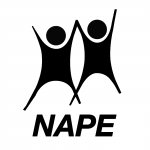Founding Member John Coe – NAPE 007
Mark Taylor talks to founding NAPE member John Coe about his educational experiences, views and involvement with the National Association for Primary Education since 1980.
John Coe began teaching in Essex. After primary headships, first of a small rural school and then of an urban school serving an underprivileged community; he joined the West Riding of Yorkshire authority as Inspector of Schools. His second local authority appointment extended over 16 years as Senior Adviser to Oxfordshire. In 1984 he moved into Higher Education as Course Leader of the PGCE Primary Course at the London Institute of Education. A later move to Oxford Brookes University involved him in research and both initial and in-service education. He is a Fellow of the University and a founding member of NAPE.
Our aim is to achieve a higher priority for the education of children from birth to 13. High quality learning in the early years of life is vitally important to the creation of an educated society. Young children are not simply preparing for the future, they are living a never to be repeated time of life and the best way to learn is to live.
What are the criteria of a good junior school? – NAPE 006
A Report to the Junior School Sub Panel – Ministry of Education – 17th May 1946
The National Association for Primary Education present an annual lecture with a guest speaker who creates their talk inspired by the work of Christian Schiller.
This episode is read by Peter Cansell from the book ‘Christian Schiller in his own words’
CHRISTIAN SCHILLER CBE, MC, MA
Christian Schiller was born on the 20th September 1895. He went to a prep school and then to Gresham’s School where he was head boy. Military service in the First World War followed and he was wounded in action.
After the war he read mathematics at Cambridge and then studied with Percy Nunn at the London Day Training College before beginning his teaching career. In 1924 he was appointed HMI and then followed a long period of work with the schools in Liverpool where his
contact with poor children and their families was a deeply formative experience. He became District Inspector and later filled this role in Worcestershire.
In 1946 he became Staff Inspector for Primary Education and his influence, often in partnership with his friend Robin Tanner, HMI and etcher, was strongly felt as elementary schools developed into primary schools with a distinctive child centred approach which drew on children’s innate creativity and which recognised the powerful learning which comes from direct experience.
On his retirement in 1955 he began a new career as he created a one year course at the University of London Institute of Education for teachers and heads seconded from their schools. Each course was kept small, no more than 12 people who spent their year visiting schools and in discussion led by Schiller who often remained largely silent until he revealed his vision and optimism about the future in a brief summing up. There were no examinations or required coursework yet, as this writer will testify, everyone worked extremely hard. The course was hugely influential and most of his former students have gone on to hold senior leadership positions in education.
Christian Schiller died on the 11th February 1976. The following year the first memorial lecture was presented in London and the annual lectures, now organised by the National Association for Primary Education, continue to the present day. We are pleased to be able to celebrate the work of this great man who contributed so much to the principles and practice of primary education. To those who say look at us, obsessed with children being coached to pass tests, schools competing rather than co-operating, I reply , look more deeply , beyond today’s political froth. Schiller’s work continues and one day, will prevail.
—————————————————————————————
‘Christian Schiller in his own words’ was published by the Association in 1979. The book is available price £5.00 from the NAPE national office.
E: nationaloffice@nape.org.uk
T: 01604 647646
Information Officer Peter Cansell – NAPE 005
Today on the NAPE podcast we get some background on Information Officer – Peter Cansell.
Peter talks to Mark about his school experience, how he became a teacher and then a headteacher.
His route was less than traditional and these experiences have shaped his desire to support children to follow their passion.
Peter has been in education professionally for 35 years, teaching in middle schools in Oxford, doing advisory work, teaching higher education and as a Primary Headteacher at Harwell Primary School. He retired from that post in September 2014, but has continued as Chair of OPHTA (Oxfordshire Primary Headteachers’ Association), was elected to become Chair of the National Network of Chairs of Headteachers’ Groups in June 2014 and was delighted to have become a NAPE council member this year, serving on the editorial board for Primary First. In January of 2015 he co-founded the Oxford School of Thought, an independent education think tank. He is a trustee and chairs the management committee of another charity, Full Circle, which is well regarded for its ground breaking intergenerational work.
Our aim is to achieve a higher priority for the education of children from birth to 13. High quality learning in the early years of life is vitally important to the creation of an educated society. Young children are not simply preparing for the future, they are living a never to be repeated time of life and the best way to learn is to live.
An introduction to National Association for Primary Education – NAPE 004
THE WAY WE WORK FOR PRIMARY EDUCATION
The National Association for Primary Education (NAPE) brings together everyone who has a concern for the learning of children from birth to 13 years. Members and affiliated schools work to improve education through the Early, Primary and Middle Years.
- All are welcome as members; Heads, Teachers, Teaching Assistants, Parents, School Governors. Inspectors, Administrators and entire School Communities.
- Members have an important voice exercised democratically. We influence public opinion and regular meetings are held with government ministers. The association is totally neutral politically.
- There are meetings of members both locally and nationally. Local associations can be formed.
- Conferences and workshops are arranged both locally and nationally.
- The association is administered by an elected National Council meeting termly to review progress and discuss national issues. Detailed administration is delegated to an Executive Committee which reports to the Council.
- NAPE is a prominent member of the Primary Umbrella Group which brings together all organisations working in the primary sector including subject associations and unions. This is a new and rapidly developing field of work which is facilitating cooperation and partnership.
- All aspects of education are experienced by children in their primary schools and we have strong links with subject associations.We often engage in cooperative ventures with them.
The National Association for Primary Education speaks for young children and all who live and work with them.
Our principles
The National Association for Primary Education speaks for young children and all who live and work with them.
Our aim is to achieve a higher priority for the education of children from birth to 13. High quality learning in the early years of life is vitally important to the creation of an educated society. Young children are not simply preparing for the future, they are living a never to be repeated time of life and the best way to learn is to live.
Primary schools should be centred upon the characteristics of childhood. The children are not miniature adults and they see their expanding world, think about it, develop ideas and acquire skills to deal with it in distinctive ways appropriate to their early development.
Teachers who specialise in the education of the young should be trusted to use their judgement in matching learning to the individual needs and responses of the children. They have a vital role alongside the child in supporting and structuring learning. Underlying primary pedagogy is the knowledge that young children learn best through their own fully sensory experience. Ideas are drawn out of personal experience and then held in the mind. Skills, which are always based upon ideas, are best learned in action as they are needed in life.
An invitation to join us.
Because everyone who shares time with a young child is to some degree a teacher our membership is open to all who are in broad agreement with our principles. We believe in a strong and continuous partnership between parents and teachers. Members become part of a national network which has effective links with all other voluntary associations working to improve the quality of early and primary education.
Teachers, heads, parents, carers, students, school governors, teacher trainers, nursery nurses, teaching assistants, administrators and consultants — all are welcome.
Belonging
The network’s activities are expanding both locally and nationally. Members are kept in touch through our newsletter, NAPENews and the journal, Primary First which is posted direct to members and available both in paperback and on-line. The NAPE website is updated regularly and critical comment including members’ views on current issues are publicised. We are fully involved in Twitter and Facebook and post regular podcasts. Conferences and Trade Fairs attract substantial attendances. The National Office maintains a 24/7 telephone helpline and a members’ directory so contact is always available. The journal is the only exception to the maintenance of communication by telephone and on-line. The prime focus of our work is in line with our principles, that is to say the education and upbringing of children in their earliest years and not the bureaucracy which invades current life. Administration, kept as simple and swift as possible is undertaken by volunteers who serve pro bono on the National Council and the Executive. Members who feel able to contribute to the smooth running of the association are elected or co-opted to serve on the Council.
Undoubtedly, membership of NAPE enhances and contributes to the professionalism of all who join us.
|
Where We Stand Making Our Voice Heard Members alongside the children in their schools can be confident that the association is speaking for them and that the view from the classroom is vitally important in shaping NAPE’s position when we are representing primary education.
Membership benefits include:
|
|
Contact Us NAPE National Office Moulton College Moulton Northampton NN3 7RR E: nationaloffice@nape.org.uk T: 01604 647646 www.facebook.com/NAPEofficial @N_A_P_E Visit us online at: www.nape.org.uk Join online at: www.nape.org.uk/how-to-join Reg. Charity Number: 289645: a partnership to promote the education of children from birth to 13 As mentioned on the podcast |
Create Education 3D Printing – NAPE 003
Create Education invited Peter Cansell and Mark Taylor from the National Association for Primary Education to the TCT Show held at The National Exhibition Centre in Birmingham, UK to discuss how 3D printing is inspiring children in schools.
Paul Croft a Director of UltimakerGB the UK & Ire operations for Ultimaker and the Founder of the CREATE Education Project.
Sonya Horton produces the educational content for the Create Education Project.
The CREATE Education Project brings together game changing technology with inspirational content and creative minds. This collaborative platform is designed to provide FREE resources and support to help educators to introduce and embed 3D Printing technology in the classroom. These include professional development resources, lesson resources, project ideas and inspiration. Contributors and community members are provided with a network of people embracing the same passion for sharing and improving access to education.
In order to ensure everybody has the opportunity to benefit from 3D printing and other exciting tech we reached out and asked educators and industry leaders what the challenges were and how can we make the best of the opportunities. We aligned these with our core values and CREATE Education Project was the result.
3D printing provides primary schools with a wealth of opportunities for engaging pupils right across the curriculum. This dedicated area of the CREATE website provides links to a wide range of resources, ideas and support to help Primary Schools in embedding 3D printing across the school at all levels and in multiple subject areas, using it as a tool to increase pupil engagement and attainment.
If you are new to 3D printing, the Primary Curriculum Guide provides a great starting point, but also take a look at the links below to all the content suitable for Primary schools. The site is constantly being updated with new resources, so why not bookmark this page so you always have instant access to everything you need.
www.createeducation.com/primary-education/









